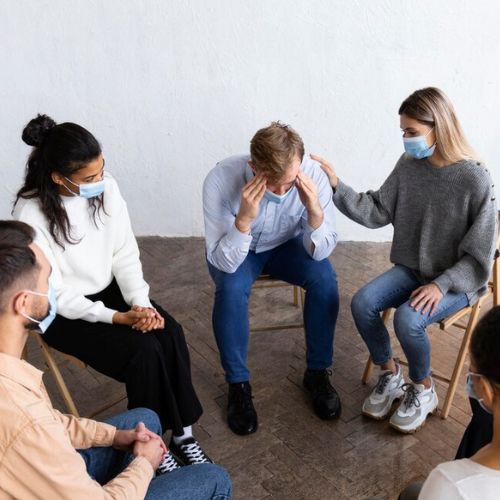
Anxiety / Depression Rehabilitation Centre
Anxiety is a complex combination of negative emotions that includes fear, apprehension and worry, and is often accompanied by physical sensations such as palpitations, nausea, chest pain, and/or shortness of breath. Anxiety disorders affect thousands of people, but there is treatment available. Anxiety Rehabilitation Centre carries a wide variety of anxiety medications to help treat these disorders.At our Anxiety Rehabilitation Centre, we understand that anxiety can be overwhelming and life-altering. Our mission is to provide a safe, supportive, and compassionate environment where individuals can find relief, recovery, and a renewed sense of well-being.At Nav Jeevan Nasha Mukti Kendra's Depression Rehabilitation Centre, where we are committed to providing compassionate care and effective treatment for individuals struggling with depression. Our holistic approach integrates medical, psychological, and social support to help you regain control over your life and achieve lasting wellness.
Call NowFinding the Help You Need for Anxiety Disorder Diagnosis
Living with anxiety can be challenging, but understanding and diagnosing it is the first step toward effective treatment. If you or a loved one are experiencing symptoms of an anxiety disorder, here are some steps to help you find the right diagnosis and support:
1. Recognize the Symptoms
Anxiety disorders can manifest in various ways, including:
Excessive worrying
Restlessness
Fatigue
Difficulty concentrating
Irritability
Muscle tension
Sleep disturbances
If these symptoms persist and interfere with daily life, seeking professional help is crucial.
2. Consult a Primary Care Physician
Your primary care physician (PCP) is a good starting point. They can conduct an initial evaluation, rule out other medical conditions, and refer you to a mental health specialist if necessary.
3. Find a Mental Health Professional
Mental health professionals who can diagnose and treat anxiety disorders include:
Psychiatrists: Medical doctors who specialize in mental health. They can diagnose anxiety disorders, prescribe medication, and offer therapy.
Psychologists: Trained in psychotherapy and can provide counseling and behavioral therapy but cannot prescribe medication.
Licensed Clinical Social Workers (LCSWs) and Licensed Professional Counselors (LPCs): Offer therapy and counseling.
4. Undergo a Comprehensive Evaluation
The mental health professional will likely conduct a comprehensive evaluation, which may include:
Clinical Interviews: To gather detailed information about your symptoms, medical history, and family history.
Questionnaires and Self-Assessment Tools: Standardized tools to assess the severity of your anxiety.
Physical Examination: To rule out any underlying medical conditions.
5. Understand the Diagnosis
Anxiety disorders include several types, such as:
Generalized Anxiety Disorder (GAD)
Panic Disorder
Social Anxiety Disorder
Specific Phobias
Obsessive-Compulsive Disorder (OCD)
Post-Traumatic Stress Disorder (PTSD)
Understanding your specific diagnosis can help tailor the treatment plan to your needs.
Overcoming Your Anxiety
Anxiety can be a daunting challenge, but with the right tools and strategies, you can regain control and lead a fulfilling life. Overcoming your anxiety is something that takes time. This means that you cannot expect it to go away overnight or even in just a few days. This does not mean that you will have to live with it the rest of your life, but you may have to undergo some ongoing treatment to ensure that you stay free of the attacks. Look for the professional help at Nav Jeevan Rehab Center that you need so that you do not have to live in fear each day that you are going to have panic attacks.Overcoming anxiety is a journey, not a destination. Stay patient with yourself and persistent in your efforts. Celebrate your progress, no matter how small.
